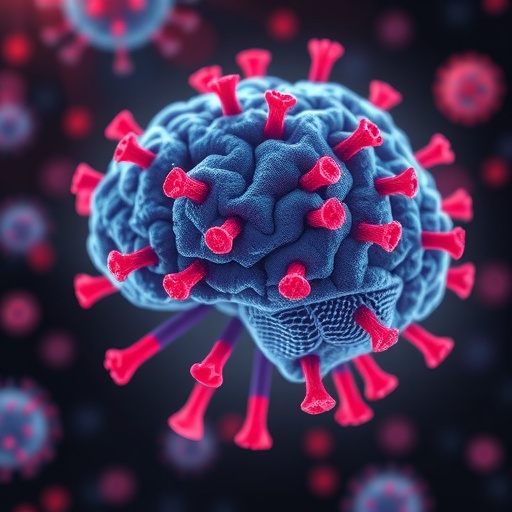In recent months, significant attention has been directed towards the effects of COVID-19 on various populations, particularly focusing on pediatric patients. A compelling study conducted in Beijing has shed light on the clinical characteristics and outcomes associated with COVID-19-related acute encephalopathy in children during the Omicron wave. This important research by Huang et al. provides vital insights into the neurological complications arising from SARS-CoV-2 infections and underscores the necessity for vigilant monitoring of young patients.
Acute encephalopathy is a severe neurological condition characterized by altered consciousness, cognitive dysfunction, and a wide range of additional neuropsychological symptoms. The onset of such complications during the Omicron variant surge draws a clear connection between the evolving nature of the virus and its implications for pediatric health. It has been rising exponentially, contributing to a growing concern among healthcare professionals as they grapple with this emerging trend.
The study involved a comprehensive, single-center prospective design that meticulously followed pediatric patients diagnosed with confirmed COVID-19 infections. Utilizing thorough clinical assessments and neurological evaluations, the researchers were able to compile a robust data set, delineating not only the prevalence of acute encephalopathy among these children but also detailing the symptomatic presentations observed. This level of thoroughness is crucial for understanding how COVID-19 can manifest in younger populations and enables more effective interventions.
One of the striking findings of this research is the variety of neurological symptoms that presented among the affected children, ranging from mild alterations in consciousness to severe neurological deficits requiring intensive medical intervention. Early identification of these symptoms can lead to timely treatment, potentially improving outcomes for affected patients. Moreover, the research highlighted that certain risk factors, such as preexisting health conditions, may exacerbate the severity of encephalopathy, presenting further challenges to clinicians.
As the Omicron variant proliferated, the researchers observed a marked increase in cases of acute encephalopathy. This finding raises questions about the neurotropic capabilities of the variant compared to previous strains, illustrating the evolving landscape of the pandemic. The implications of these findings extend beyond immediate clinical care, informing public health strategies and resource allocation as healthcare systems face unprecedented demands.
In scrutinizing the demographic data, the study revealed that children of various age groups were affected, though specific clusters of cases were predominantly observed in younger patients. This age-related susceptibility points towards potential biological factors that could be influencing the neurological impacts of the virus, necessitating further research to uncover the underlying mechanisms at play.
An additional focal point of the research was the outcomes of the affected patients. Preliminary results indicated that while some children responded positively to treatment, others faced long-term neurological consequences, emphasizing the unpredictable nature of the virus’s effects. This variability in outcomes underscores the importance of implementing multidisciplinary approaches in the management of pediatric COVID-19 cases.
Given the trajectory of the pandemic, ongoing surveillance of COVID-19’s impact on children’s health is imperative. The study advocates for the establishment of dedicated protocols that identify at-risk populations, enabling healthcare practitioners to respond proactively. Awareness campaigns may also play a pivotal role in educating parents about the signs of neurological complications, fostering an environment where seeking timely medical advice becomes the norm.
Moreover, the research calls for enhanced collaboration between pediatric and neurological specialists as they navigate the complexities of COVID-19-related complications. The intersection of infectious disease and neurology presents unique challenges that require tailored strategies to optimize patient outcomes. Such collaborative efforts could lead to the development of specific guidelines that inform clinical practice and shape future research endeavors.
The intricate relationship between viral infections and neurological health is not a new phenomenon; however, the severity and frequency of such complications amidst the pandemic introduce a new dimension of urgency. Growing evidence suggests that viral infections can precipitate autoimmune responses that might contribute to neurological damage, further complicating the clinical landscape.
In response to these challenges, ongoing research contributes to a broader understanding of the long-term effects of COVID-19, particularly its association with neurological complications like acute encephalopathy. This particular study serves as a reminder of the adaptive nature of viral pathogens and the need for continuous vigilance in monitoring their effects on vulnerable populations.
As the researchers posit, future investigations would greatly benefit from multi-site studies that incorporate diverse patient demographics. Such endeavors could yield a more comprehensive overview of COVID-19 and its extensive health ramifications. International collaboration on research efforts may pave the way for more informed and effective responses to the ongoing pandemic, establishing a framework for managing emerging infectious diseases in the future.
The message is clear: as new variants of the virus surface, the healthcare community must remain prepared to adapt to the changing landscape of COVID-19. High levels of adaptability, ongoing education, and an emphasis on research will be central in combatting the wide-ranging effects of this unpredictable disease, particularly in the ever-critical pediatric population.
In conclusion, the study by Huang and colleagues represents a significant contribution to our existing knowledge of COVID-19’s pediatric manifestations. The insight gained from examining the clinical characteristics and outcomes of acute encephalopathy during the Omicron wave is invaluable, paving the way for a more comprehensive understanding of the virus, guiding clinical approaches, and shaping future research endeavors. As we move forward, it is essential to maintain a focus on protecting our youngest populations and ensuring that the healthcare community is equipped to face the challenges posed by this pandemic head-on.
Subject of Research: Clinical characteristics and outcomes of COVID-19-Associated acute encephalopathy in pediatric patients during the Omicron wave.
Article Title: Clinical characteristics and outcomes of COVID-19-Associated acute encephalopathy in pediatric patients during the Omicron wave in beijing: a single-center prospective study.
Article References:
Huang, S., Chen, J., Li, F. et al. Clinical characteristics and outcomes of COVID-19-Associated acute encephalopathy in pediatric patients during the Omicron wave in beijing: a single-center prospective study.
BMC Pediatr 25, 688 (2025). https://doi.org/10.1186/s12887-025-05970-5
Image Credits: AI Generated
DOI: 10.1186/s12887-025-05970-5
Keywords: COVID-19, acute encephalopathy, pediatric patients, Omicron variant, neurological complications, public health.




